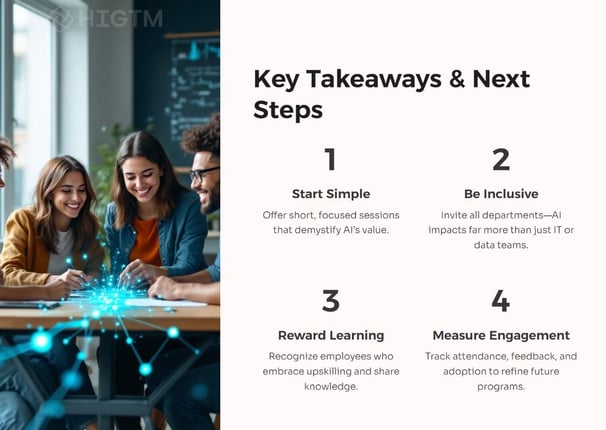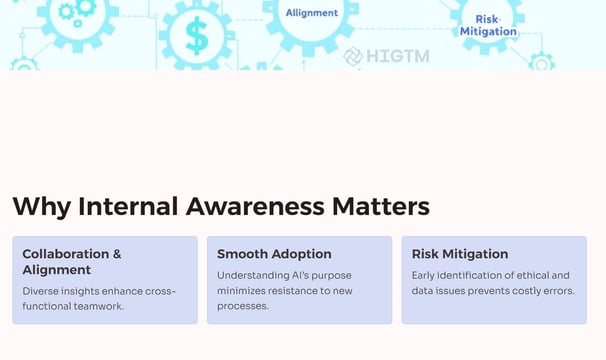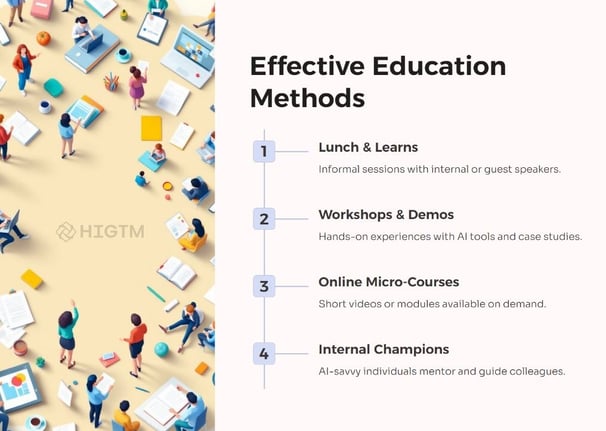23. How to Build Internal AI Awareness and Empower Your Team: A Practical Guide for SMEs
Introducing Artificial Intelligence (AI) into a small or medium-sized enterprise can feel daunting—but one of the biggest determinants of success is internal awareness. When employees across all departments understand AI’s purpose, they become active supporters rather than skeptical observers. This guide dives into why internal AI education matters, how to structure engaging learning experiences, and ways to tackle common fears and resistance.
Q1: FOUNDATIONS OF AI IN SME MANAGEMENT - CHAPTER 1 (DAYS 1–31): CORE AI CONCEPTS & VALUE PROPOSITION
Gary Stoyanov PhD
1/23/20254 min read

1. Why Internal AI Awareness Is Essential
1.1 Bridging Knowledge Gaps
Many employees might see AI as a lofty concept relevant only to software engineers. An awareness program clarifies how AI ties into day-to-day tasks, whether that’s automating repetitive data entries or enabling personalized marketing campaigns.
1.2 Boosting Cross-Functional Collaboration
The cross-departmental nature of AI means insights can come from unexpected places: a customer service rep’s firsthand understanding of client pain points, or a logistics manager spotting inefficiencies in shipping. An educated workforce accelerates synergy across the organization.
1.3 Fostering a Growth Mindset
AI isn’t static; it evolves with data trends and new algorithms. A well-informed team is more flexible, open to change, and willing to adapt as your AI initiatives mature.
2. Overcoming Resistance to AI
2.1 Fear of the Unknown
Reality Check Sessions: Start by explaining real-world use cases, so AI seems approachable rather than abstract.
Inclusive Communication: Invite all employees to open Q&A sessions where no question is too basic.
2.2 Job Security Concerns
Augmentation vs. Replacement: Stress that AI often removes tedious tasks, freeing employees for higher-level roles.
Success Stories: Showcase companies where AI led to expanded roles and upskilling, not layoffs.
2.3 Time & Bandwidth Issues
Micro-Learning: Offer short tutorials or e-learning modules that fit into tight schedules.
Scheduled “Learning Windows”: Allocate a few hours weekly or monthly for structured AI training.
3. Core Elements of Effective AI Education
3.1 Tailored Content
Non-Technical: Focus on examples, narratives, and visuals that illustrate AI’s impact without heavy math or code.
Technical: Offer deeper modules or advanced labs for data-savvy roles.
3.2 Engaging Formats
Workshops & Demos: Hands-on exploration of AI tools fosters both excitement and confidence.
Lunch & Learns: Quick, informal gatherings encourage open dialogue, especially if paired with refreshments.
Online Learning Portals: Self-paced videos or reading materials let employees learn at their preferred speed.
3.3 Incremental Progression
Level 1: Fundamentals—Terminology, benefits, basic ethics.
Level 2: Role-Based Skills—How marketing, operations, HR, or finance can harness AI.
Level 3: Advanced Mastery—Data science fundamentals, MLOps best practices, and deeper specializations.
4. Building a Culture of Curiosity
4.1 AI Ambassadors or Champions
Identifying enthusiastic early adopters from various departments can create internal “go-to” people for AI-related questions. These champions can host demo days or office hours, boosting organic knowledge sharing.
4.2 Leadership Endorsement
When upper management actively participates in training sessions or publicly recognizes employees who embrace AI tools, it sends a clear message: Learning is valued. This endorsement alleviates skepticism and underscores that AI literacy is integral to the company’s direction.
4.3 Encouraging Experimentation
Pilot-Friendly Mindset: Encourage departments to try small-scale AI experiments—even if some fail.
Fail Fast, Learn Fast: Document lessons from less successful pilots to refine future approaches.
5. Practical Approaches to Internal Awareness
5.1 Structured Workshops & Webinars
Intro to AI Series: A few half-day sessions covering basics, key terms, and relevant SME case studies.
Department-Focused Modules: For instance, “AI in Marketing” or “AI for Customer Support,” spotlighting specific use cases.
5.2 Online Micro-Learning
Short Video Lessons: Topics like “What is Machine Learning?” or “How Chatbots Work,” delivered in 5-10 minute increments.
Scenario-Based Quizzes: Reinforce concepts through quick interactive scenarios, e.g., choosing the right AI tool for a given business problem.
5.3 Internal Communication Channels
Slack/Teams AI Channel: A dedicated space where employees share articles, tips, or questions.
Monthly AI Digest: A short newsletter highlighting new developments, upcoming events, or success stories.
5.4 On-the-Job Learning
“Working Out Loud” Projects: Encourage employees to narrate how they applied an AI tool in their daily tasks.
Cross-Functional Sprints: Pair a data-literate staff member with a domain expert to solve a small, real business challenge using AI analytics.
6. Measuring and Scaling Awareness
6.1 Engagement Metrics
Session Attendance: Track how many people join workshops or complete modules.
Participation: Look for an increase in AI-related suggestions or questions on internal forums.
6.2 Knowledge Retention
Pulse Surveys: Quarterly or monthly mini-surveys to gauge employees’ comfort with AI terms and tools.
Practical Uptake: Monitor how many teams incorporate new AI insights into their workflows or pilot projects.
6.3 Iteration and Feedback
Post-Session Evaluations: Ask participants what they found helpful or confusing.
Adapting Content: If employees consistently struggle with certain topics, develop deeper or simpler resources.
7. Case Studies: Internal Education in Action
7.1 Medium-Sized Retail Chain
This retailer held weekly 30-minute sessions on topics like “AI Inventory Forecasting” or “Customer Segmentation.” Attendance soared once managers realized they could cut manual tasks and errors by learning the basics of data analytics. After three months, store managers collaborated with analytics staff to successfully pilot an AI-based reorder system.
7.2 Finance Startup
A small finance tech team created short “AI Explainer” videos targeted at non-technical employees, addressing FAQs like “Will AI replace investment advisors?” and “How does AI detect fraud?” The result: a noticeable drop in misconceptions and more staff volunteering for data-centric projects.
8. Common Pitfalls to Avoid
Overloading Employees with Jargon
Keep content approachable, especially at the start.
One-Size-Fits-All Training
Provide departmental context. Marketing folks have different needs than supply chain analysts.
Lack of Follow-Up
Running a single workshop isn’t enough. Reinforcement and accessible resources keep momentum alive.
Ignoring Cultural Resistance
Even well-designed programs can fail if underlying fears or job security concerns remain unaddressed.
9. Benefits of a Well-Educated Team
Faster AI Adoption: With less skepticism, projects get off the ground quickly.
Stronger Innovation Pipeline: Employees who grasp AI fundamentals often suggest fresh, data-driven initiatives.
Cross-Organizational Alignment: Common terminology and vision bridge departmental silos.
Increased ROI: Educated users maximize AI tools, reducing wasted software licenses or hardware resources.
10. Future-Proofing Your Workforce
AI evolves rapidly, and so should your training approach. Keep content and workshops updated. Encourage employees to stay curious—maybe through ongoing e-learning subscriptions or partnerships with local tech communities. By embedded learning into your corporate culture, you maintain a workforce that adapts as AI capabilities expand.
Building internal AI awareness is a vital step in ensuring your enterprise’s success. When employees understand AI’s relevance and potential, they become key drivers of efficiency, creativity, and strategic advantage.
Looking for a tailored approach?
Contact us to schedule a Private Team Training Consultation.
We’ll partner with you to design effective education programs, equip internal champions, and foster an AI-ready culture that propels your SME forward.






Turn AI into ROI — Win Faster with HIGTM.
Consult with us to discuss how to manage and grow your business operations with AI.
© 2025 HIGTM. All rights reserved.
